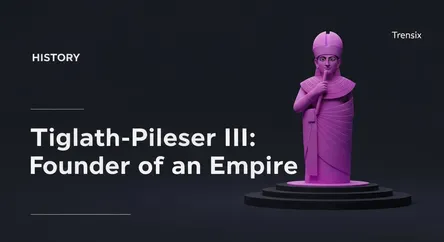History
Tiglath-Pileser III: Founder of an Empire

Discover Tiglath-Pileser III, the Assyrian king who forged an empire through radical military and civil reforms, changing the ancient world.
What is it?
Tiglath-Pileser III was a formidable king of Assyria who reigned from 745 to 727 BCE. He is widely considered the founder of the Neo-Assyrian Empire. Ascending to the throne during a period of civil unrest and Assyrian decline, he seized power and fundamentally reformed the state. His birth name was Pulu, which is mentioned in biblical texts. He centralized power by reducing the authority of powerful nobles and governors, reorganized the government by creating smaller provinces, and established one of history's first professional standing armies. These reforms revitalized Assyria, transforming it into a dominant military and political force.
Why is it trending?
Tiglath-Pileser III remains a key figure in historical studies due to his revolutionary impact on empire-building. His administrative and military strategies became a blueprint for later empires, including the Persian and Roman. His reign marked the beginning of the "last and greatest phase of Assyrian expansion." Archaeological discoveries, including royal inscriptions and palace reliefs, continually affirm the historical accounts of his reign, including those in the Bible which detail his campaigns in Syria and Palestine. His methods of control, such as mass deportations to break resistance and integrate conquered peoples, are a subject of ongoing study and debate among historians.
How does it affect people?
Tiglath-Pileser III's policies had a profound and often brutal impact on the people of the ancient Near East. His military campaigns resulted in the conquest of vast territories, including Babylonia, Syria, and parts of Israel. He implemented a policy of mass deportation, forcibly relocating hundreds of thousands of people from conquered lands. This strategy was designed to crush national identities, deter rebellion, and supply labor for imperial building projects. For conquered populations, this meant the loss of their homes, culture, and autonomy. For the Assyrians, his expansion brought immense wealth from tribute and looted goods, and his administrative reforms created a more stable and efficient state.